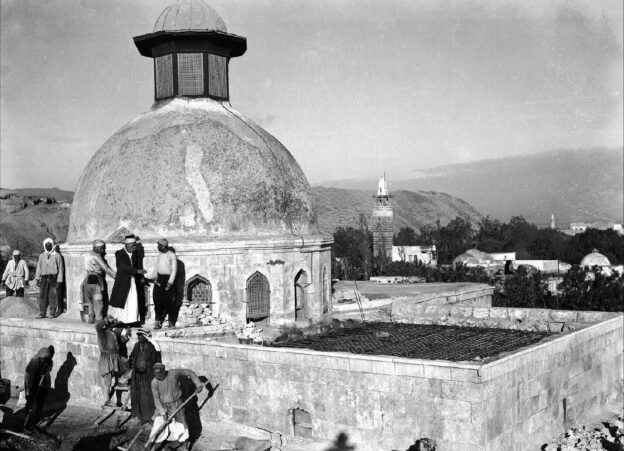
Michel Écochard in an propeller driven airplane. The Écochard Archive contains a number of aerial views taken by the architect himself.
It he were alive today, architect and urban planner Michel Écochard would be celebrating his 114th birthday. Born March 11, 1905 in Paris, he went to work for the Colonial Antiquities Service of Syria and Lebanon almost immediately after graduating from the École des Beaux-Arts. By the time of his death on May 24, 1985 he had received the Aga Khan Award for Architecture (AKAA) for the restoration of the Azem Palace in Damascus, and carried out projects in Cameroon, the Congo, Côte d’Ivoire, France, Guinea, Iran, Kuwait, Lebanon, Morocco, Pakistan, Senegal, Syria, and Turkey.
In the mid-1980s Écochard donated an archive of around 500 plans, 1500 slides and large-format positive films, 10,000 negatives in large format, 35-millimeter film strips, in black and white and color, 50 reports, books, notes, and a collection of articles and clippings to the AKAA. In an effort to make the archive more readily available to scholars and researchers, in 2017 the Aga Khan Documentation Center at MIT (AKDC@MIT) was chosen as the repository of the archive. A representative sampling is available on Archnet, and on Archnet’s new Hoverpin layer.
Some of the architecture projects in the archive include the Chancellery for the French Embassy in Cameroon, the University of Karachi, and the National Museum of Syria, as well as unbuilt projects such as a Dispensary Project in Damascus. There are also urban development plans for Damascus, Casablanca, Dakar and Mashhad.
In light of the massive destruction of cultural heritage sites as a result of the war in Syria, publications such as La Restauration des monuments islamiques en Syrie as well as albums of the Ecochard’s own photographs documenting historic sites in Aleppo, Damascus, and elsewhere have become increasingly important.
Check back on Archnet as more materials are digitized, cataloged and posted to the Ecochard Archive.


